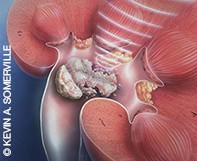Peer Reviewed
Feature Article Urology
Renal stones: first steps and keys to reducing recurrence
Abstract
In patients with a renal stone, management aims to detect complications, triage to expectant observation or active intervention and identify any predisposing factors. Referral for active urological intervention or detailed metabolic evaluation may be indicated. Dietary and lifestyle interventions may help decrease the risk of recurrences.
Key Points
- In patients with a suspected renal stone, history taking, examination and investigation aim to confirm the diagnosis and detect any complications, such as sepsis or renal damage, and underlying factors that increase the risk of recurrence.
- Options for treatment of renal stones include expectant observation if the patient has good renal function, well-controlled pain and no evidence of sepsis, or a need for active urological intervention.
- Urinary tract infection in the presence of obstruction is a medical and surgical emergency, requiring immediate relief of the obstruction.
- Factors that contribute to renal stone formation should be addressed to prevent further stones; the most important lifestyle interventions are increased water intake and reduced protein and sodium intake.
Picture credit: © Kevin A. Somerville
Purchase the PDF version of this article
Already a subscriber? Login here.

